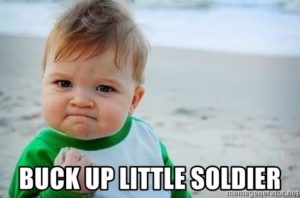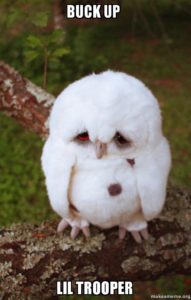Are you feeling down? Did someone tell you to buck up? This post unpacks the meaning and origin of this expression.
Meaning
The expression 'buck up' is similar to the phrase 'cheer up.' It's a motivating statement to people to break them out of a negative mental state. If you tell someone to 'buck up,' you're telling them to summon the courage they need to change their attitude or actions.
The phrase 'buck up' means that a person is feeling down temporarily, and you need them to return to good form. The person appears demotivated, upset, or depressed, and you're telling them to change their attitude and cheer up.
The phrase can refer to minor life events. Telling someone to buck up that recently lost a loved one would be uncouth behavior.
Example Usage
"Don't worry, Kim, it's not the end of the world. Buck up. You'll be back on top of things in no time. You'll look back on this one day and laugh."
"There's nothing you can do to control it. Buck up and gather your wits around you. It's the only way you'll escape this situation."
"C'mon, Sam, buck up, son. There's no reason for you to be feeling like this. You have your whole life ahead of you. This is a temporary setback, I promise."
"Buck up, buddy. Stop being such a wuss and take control of your life. I'm sick of seeing you p[lay the victim. It's time to accept some responsibility for your actions."
"Don't worry about it. Buck up and get your head out of the gutter. There could be a millio0n other bad things that could happen. It's not that bad."
"Stop being a Debbie Downer and buck up, why don't you? I'm tired of seeing your gloomy facial expressions."
"All it takes is a change of thinking to alter your emotional state. Buck up and get at it. No one is going to for it for you."


Origin
The expression 'buck up' originated in England in the 19th century. During the 'Regency' era in British history, 'bucks' or 'dandies' were regarded as 'snappy dressers' with a good fashion sense for the time. Some language experts believe the word 'buck' in this sense originates from the majestical beauty of a male stag.
The term 'buck up' originally referred to 'dressing up' or dressing smart. The phrase shifted to the modern meaning of 'cheer up' in the late 1880s. The earliest mention of the term in its current context comes from 'The Wouldbegoods' written by Edith Nesbit in 1901, which appears as follows.
"Be a man! Buck up!",
Author and poet D.H Lawrence used the phrase in his work, 'Sons and Lovers,' published in 1913, where it appears as follows.
"Half-past eight!" he said. "We'd better buck up."
Phrases Similar to Buck Up
- Cheer up.
- Chin up.
- It’s not the end of the world.
Phrases Opposite to Buck Up
- I hope you feel terrible.
What is the Correct Saying?
- Buck up.
Ways People May Say Buck Up Incorrectly
The phrase 'buck up' has nothing to do with animals. Using the expression to describe how there's a buck you need to shoot is incorrect. The phrase has a serious or lighthearted connotation, depending on the situation.
Acceptable Ways to Phrase Buck Up
You can use the expression 'buck up' to replace other motivating statements like 'cheer up' or 'chin up.' The phrase is common throughout the western world and popular among older and younger generations. It's a way of telling someone to forget about the pain of the present and put their bad emotions in check.
You can use 'buck up' in social and professional situations. For instance, if your employees feel demotivated, you could give them a pep talk and tell them to buck up. If your kids feel down that they can't go outside and play in the rain, tell them to buck up because the weather looks great tomorrow. The phrase suits verbal and text-based communications.